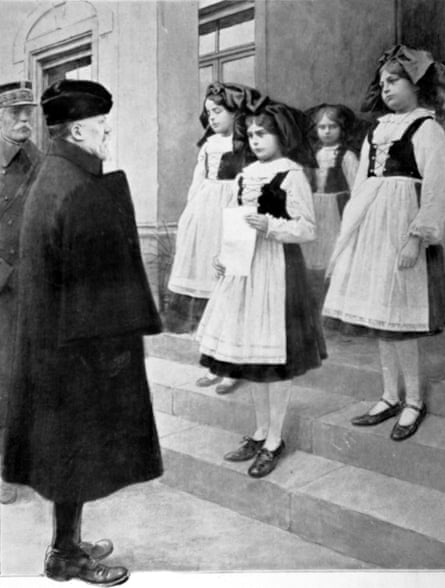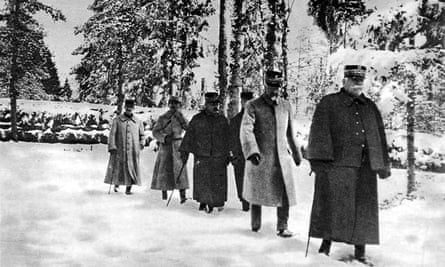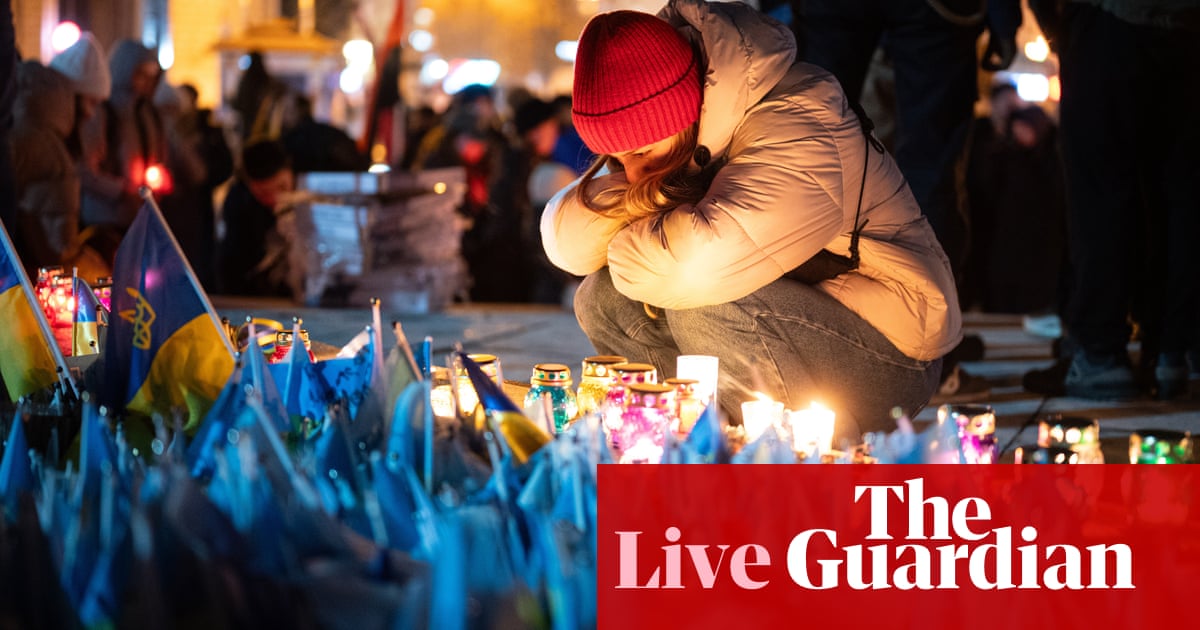Joy in the liberated countryside
30 December 1915
The following despatch has been received from Mr H Warner Allen, special correspondent of the British press with the French armies:
In the greater part of war-stricken Europe Christmas, 1915, has been but a sad festival. To find a Christmas of true happiness and rejoicing one must go either to the trenches or to those towns and villages of Alsace which, after over 40 years of suffering, are at last released from the German yoke. They are still most of them either in the fighting line or within reach of the German guns, but the Alsatian feels that he has a right to rejoice and be thankful which neither the danger of bombardment nor even the loss of his dear ones killed in the noblest of causes can destroy.
I have just spent Christmas in a small Alsatian village a few miles behind the first lines. The enemy can bombard it at their ease whenever the fancy seizes them, and the inhabitants, with such hospitality as is only to be found in the mountains, proved to us how lightly they hold death and danger in comparison with the joy and consolation of once again being French. They bore themselves as men who are the first fruits of the final victory.
For long the guns round the Hartmannswillerkopf had been thundering away remorselessly, but the Alsatians paid no attention to the terrific bombardment. They were concerned with something far more important – the weather. For it was Christmas Eve, and in every house, poor and rich, there was a Christmas tree, which every friend and relation must come and admire. If the rain went on, as unhappily it did, many fair Alsaciennes would not dare to go out in the precious village costumes handed down religiously from mother to daughter for many generations.
Picturesque Alsatian girls
The windows of the little shops were gay with Christmas trees. In the little hotel where we were staying there was a tree that reached the roof, decked humbly enough with candles, oranges, and simple toys. We had the honour of being invited to the Christmas tree which was to be visited by the General, and with the trench mud only half scraped from our boots and clothes we found ourselves in a brilliant assembly in which Christmas and war were strangely mingled. A huge Christmas tree was ablaze with light, and round it were gathered soldiers in uniforms of every kind and girls and children in the beautiful Alsatian costume.
after newsletter promotion

No local costume is more picturesque than that of the Alsatian girl – a small embroidered bonnet with two spreading black silken wings that form a perfect background to the face, richly worked corsage, and bright skirt, red for Catholic, green for Protestant, purple for Jew, half-hidden by an apron of many colours. The master of the house, who had seen Alsace wrested from the French, and who had lived to see his home restored to France, watched the scene with an emotion that words could only profane.
“If you knew,” he said, “what it means to us to see French uniforms and to hear French spoken freely all round us, you would understand our happiness despite everything. We are a stubborn, conservative people, and we do not easily forget. When, a day or two after mobilisation, we saw the French marching down from the hills, battalion after battalion, the officers with drawn revolvers ready for any attack –for they were not sure that the Boches had fled – tears of joy ran down our faces. We could not speak, and for a time the crowd was absolutely silent. Then suddenly it broke loose, and really to-day I do not know what we did in the excess of our relief.”
Just before midnight the whole party went out through the rain to the midnight mass. If one listened one could hear the distant boom of guns and remember that men were fighting a mile or two away. The great church was filled to overflowing – women from all the farms and villages round, and men in uniforms of every shade of blue. In the front seats were three generals, one the commander of the whole district, a man of a stern – almost fierce – expression, which was only qualified by a twinkle in the eye and by a gay smile that became particularly noticeable when he was admiring the marvel of the Christmas tree.
A wonderful choir
As midnight struck, the sound of the great organ filled the church, and the choir burst into the ancient carol Minuit Chrétiens, c’est l’heure solennelle. It was such a choir as the village had never seen before – men in pale-blue uniforms, many of whom were fresh from the trenches. Among the men mobilised there were many with well-trained voices, and they sang the night as they never before sang in their lives. The soloists were singers whose names are well known to every music-lover, and the violinist was the first violin of the Paris Opera. Never was service more reverent and more impressive. The carol Il est né, le divin enfant expressed all the rejoicing of the soldier who in the struggle in a glorious cause has snatched a moment’s respite and proclaims his confidence in the victory of good over evil. “Chantons la délivrance” – the words came again and again, and the voices against the rich background of the organ celebrated cheerfully and gladly the deliverance of Alsace and the whole world from the oppressors.
Half an hour later we were gathered, a gay and happy party, around a supper-table. It was the brightest side of war. Stories of the trenches, tales of heroism, were told by men who had seen and taken part in the events of which they spoke. The palm was generally given to a story told by an artillery captain of his lieutenant. “We had decided,” he said, “to get rid of a machine gun shelter that had been annoying us a great deal, and while we were about it, to knock the frontline of German trenches to pieces. The lines were so close that the colonel ordered all the front trenches to be evacuated except for my lieutenant, who had volunteered to stay there and direct the fire. My battery opened fire, and after a few rounds my lieutenant telephoned: “Very good; but if you shorten your range by 20 yards it will be still better.” As the range was over 3,500 yards, I telephoned back to ask him if he was sure that I could shorten it by so much without danger to him. He answered that it was quite safe.

After a number of rounds, he telephoned me again to shorten the range, this time by 10 yards. “Then,” he said, your shells will be falling right on the frontline of German trenches.” “All right,” I said, “you, of course, will retire to the second line.” I gave him time to get away, and then began again. Ten minutes later, to any amazement, the telephone rang again. My lieutenant had stayed at his post, though a perfect hail of French shells was bursting on the German trenches just seven yards away from him. We measured the distance. It says something for our gunners that only one shell had burst in the French trench.”
After this story a toast was drunk to Alsace, to France, and to the success of the Allied arms, and the party broke up. It was 3.30 on Christmas morning, and the guns up in the mountains were still thundering defiance at the Germans.

 2 months ago
36
2 months ago
36













































